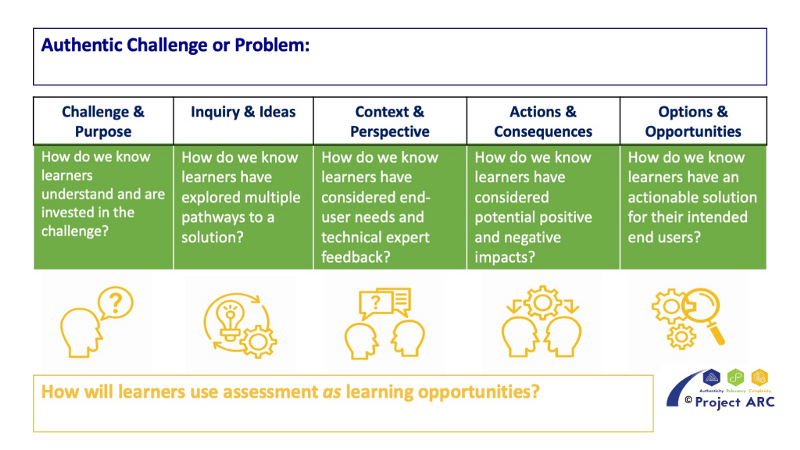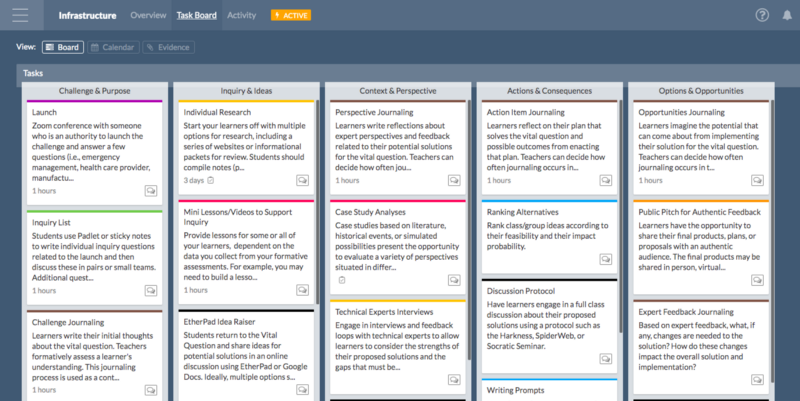With millions daily exploring new ground in remote learning, it comes as no surprise that assessment is falling flat for most. It’s like a massive educational experiment — some states have canceled standardized testing, other schools have elected to drop grades for the rest of the year, and the rest are left puzzled, planning ahead for an unknown future. But opportunity lies in the wake of this living experiment. While re-evaluating the hows, whys and whats of remote assessment, can we set a new standard for assessment altogether? What happens when we rethink project design with assessment in mind?
Project ARC, in collaboration with Headrush, aims to reframe assessment for learner-centered schools in order to help educators and students become strong designers of powerful projects. Project ARC’s assessment framework can help us pivot to consider assessment while designing our projects.
Project ARCs 5 Stages of Project Assessment

So, what does this look like in real-time? Dayna Laur and Tim Kubik, founders of Project ARC, demonstrate how to build assessment parallel to a project within Headrush with the authentic project learning experience: How can we rebuild our country’s infrastructure to handle a future worldwide crisis?
In her latest blog Infrastructure: A Remote Authentic Project Learning Experience for All, Dayna breaks down each project stage to tailor the assessment scaffolding to the approach your learners decided to take. To summarize their project module, Dayna and Tim state, “Our question is adaptable to the needs of a local context here or abroad. Since infrastructure encompasses many different areas, so too can many content areas be addressed. Health needs, statistical data analysis, distribution networks for food, public transportation dilemmas, public policy, and the education system are all areas that learners may wish to address.“
Here is a snapshot of the project task board within Headrush.
“I am a huge fan of Headrush which is a PBL management system that helps to tell the story of learning,” Dayna continues. “I always say to my own kids that my goal for them when they leave the house in the morning and go to school is for them to come home and tell me a story of their learning; unfortunately it doesn’t always happen, but that story of learning is really important. Headrush is a platform that has moveable task boards, visual todo lists, a portfolio collection, and the ability, importantly, to provide feedback on student artifacts, from both the teacher and a technical expert.”
Focusing on assessment as Dayna and Tim do in the learning experience above gives students power and autonomy in directing their own inquiry, and therefore their own learning. Whether students are engaging in interviews and feedback loops with technical experts to consider the strengths of their proposed solutions, or ranking group ideas according to their feasibility and their impact probability, students are taking ownership of their development. This is where their story of learning becomes measurable for themselves, as well as for their teachers.
While project ideas are exploding in numbers, links and lists across the internet, those ideas will fall flat without scaffolding built-in for deep learning connected to assessment. We need to thread our project ideas together for assessment, otherwise, the story of one’s learning will never come to light. Ideas, alone, are not the answer.
Tim concludes, “Project assessment is about helping students articulate and advocate for their own learning needs during a project. The goal of your assessment design is to ensure that every child has a learning experience that documents their growth across the targeted standards, skills, and attributes necessary to complete the project.”
The road ahead is a long one for many as this educational disruption will be felt for years to come. Pivoting to consider assessment while designing projects will help us recenter our profession around learning in order to continue to advance. Ultimately, we want to be a part of an educational system that makes innovative advances rather than one that makes incremental reforms. Be sure to reach out to Project ARC and Headrush as we keep the conversation going and navigate this educational experiment together.
